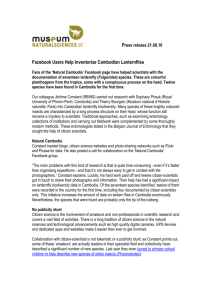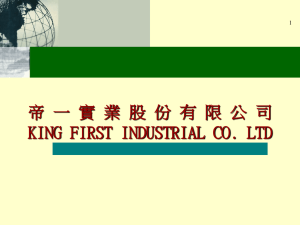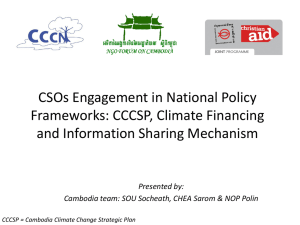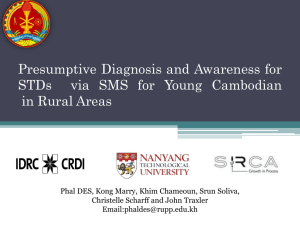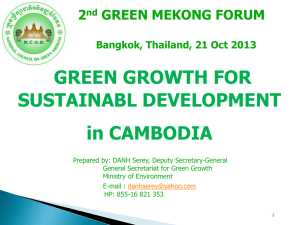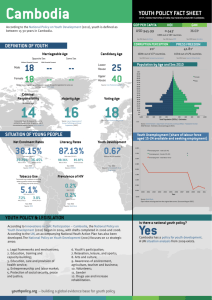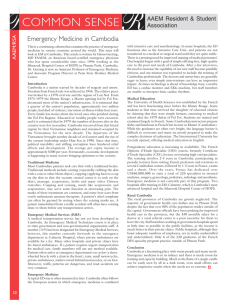Second Cambodia Development Cooperation Forum (CDCF)
advertisement
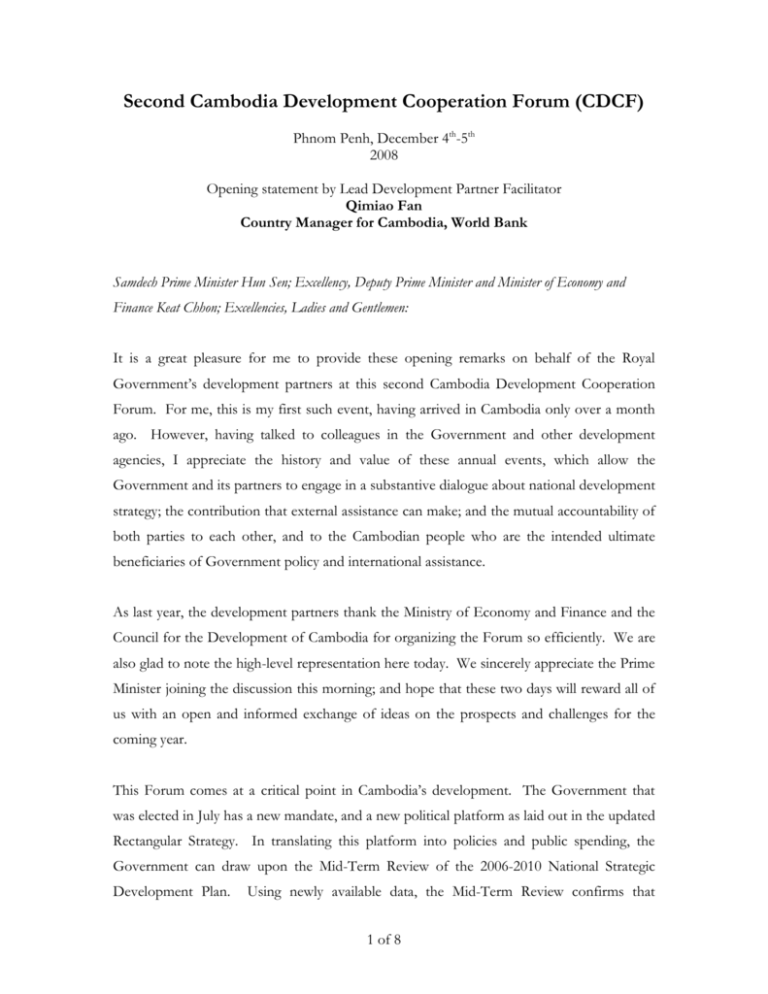
Second Cambodia Development Cooperation Forum (CDCF) Phnom Penh, December 4th-5th 2008 Opening statement by Lead Development Partner Facilitator Qimiao Fan Country Manager for Cambodia, World Bank Samdech Prime Minister Hun Sen; Excellency, Deputy Prime Minister and Minister of Economy and Finance Keat Chhon; Excellencies, Ladies and Gentlemen: It is a great pleasure for me to provide these opening remarks on behalf of the Royal Government’s development partners at this second Cambodia Development Cooperation Forum. For me, this is my first such event, having arrived in Cambodia only over a month ago. However, having talked to colleagues in the Government and other development agencies, I appreciate the history and value of these annual events, which allow the Government and its partners to engage in a substantive dialogue about national development strategy; the contribution that external assistance can make; and the mutual accountability of both parties to each other, and to the Cambodian people who are the intended ultimate beneficiaries of Government policy and international assistance. As last year, the development partners thank the Ministry of Economy and Finance and the Council for the Development of Cambodia for organizing the Forum so efficiently. We are also glad to note the high-level representation here today. We sincerely appreciate the Prime Minister joining the discussion this morning; and hope that these two days will reward all of us with an open and informed exchange of ideas on the prospects and challenges for the coming year. This Forum comes at a critical point in Cambodia’s development. The Government that was elected in July has a new mandate, and a new political platform as laid out in the updated Rectangular Strategy. In translating this platform into policies and public spending, the Government can draw upon the Mid-Term Review of the 2006-2010 National Strategic Development Plan. Using newly available data, the Mid-Term Review confirms that 1 of 8 progress achieved since 1993 has continued into recent years. The Ministry of Planning will present a summary of this review later today, so I will just pick out a few key headlines. In 2007 Cambodia experienced a fourth successive year of double-digit growth. At the end of a decade in which growth averaged 9.7 percent per annum, real per capita GDP in 2007 was double what it was in 1997. Over the last half century, very few countries have sustained such rapid expansion. Data from the 2007 Cambodia Socio-Economic Survey show that this growth has been reflected in improved living standards: the population living under the national poverty line fell further from 35 percent in 2004 to 30 percent in 2007. More rural roads have been built, cutting the time and cost required to reach a market, school or hospital. People are now more likely to seek healthcare when they are ill, rather than live with illness because they cannot afford treatment; and school enrolment amongst the poorest households continues to catch up with that of wealthier groups. In summary, rapid growth up until now has resulted in significant gains for most Cambodians. However, since we last met at the CDCF in June 2007, the economic context for Cambodia’s development has become decidedly less supportive. Much of this chilling effect is due to a world economy that has slowed dramatically in the face of rising prices for oil and food and a major crisis in the global financial system; but some of the effect is also due to factors internal to Cambodia, as rapid growth and very rapid expansion of domestic credit over the last year have created risk of overheating. Inflation has risen sharply, peaking at 25 percent in May this year; and growth in garments, tourism and construction looks set to be considerably lower in 2008 than in 2007. We do not yet have data which call tell us how these forces are affecting progress towards the targets set in the Cambodian Millennium Development Goals and the NSDP. What we do know is that the impact will vary between groups: even if, as a whole, the country can cope (or even benefit from higher prices of rice), vulnerable people will suffer from higher prices and fewer job opportunities. This underscores the critical need for a social safety net – a topic which is on our agenda for today. 2 of 8 The agenda for this Forum does a nice job in capturing the various components of the policy response that these changed circumstances require. Framing this agenda, session one summarizes the conclusions of the Mid-Term Review and the status of Government plans for a Medium-Term Expenditure Framework, or MTEF. These two presentations introduce a theme that runs throughout the next two days: namely, that to direct domestic and external resources effectively towards achieving the goals set out in the NSDP requires a more integrated approach to Government. Translating the NSDP and sector priorities into concrete policies and patterns of public spending necessitates bringing together reforms of strategic planning, public financial management, and aid management — reforms that have until now been addressed largely in parallel. To do this, the Government must be able to forecast a realistic and comprehensive medium-term resource envelope and, based on this, formulate and implement the MTEF. Such a framework will enable Government and development partners to align their support, in both the short and medium term, with national plans and priorities. To integrate policy and budget processes in this way, and align aid to national priorities using national systems, will require substantial improvements in cross-Government coordination. This will involve closer communication and integration between key central agencies — the Ministry of Planning, Ministry of Economy and Finance, and the Council for the Development of Cambodia — and between these core institutions and sector ministries. Specifically, development partners strongly encourage that during the next budget cycle that begins in March 2009, the Government develops explicit and transparent coordination arrangements resulting in an approved overall MTEF for 2010-2012. This MTEF needs to provide a clear articulation of the overall resource envelope; outline the indicative allocation of development and recurrent resources to sectors and ministries; and provide guidance to Ministries in formulating Budget Strategic Plans and Program Budgets. A framework of this kind would help the Government to progressively align budget with stated priorities, and help address bottlenecks that result in priority Ministries under-spending their budget allocations. The theme for session II today, is macroeconomic management: promoting high and inclusive economic growth by controlling inflation, attracting investment, and creating an 3 of 8 enabling environment for diversifying the economy. The background report that the World Bank has prepared for this Forum, Sustaining growth in a challenging environment, draws lessons from the previous decade in order to identify current challenges and opportunities for the future. Our first conclusion is positive: Cambodia has the potential to continue growing rapidly. But to realize this potential requires deliberate efforts to design and implement a strategy for growth. While policies that have served Cambodia well to date — policies that promote macroeconomic stability and openness to international trade — will continue to be critical, additional policies are also now needed to diversify the economy, improve productivity, and sustain growth into the next decade. First, the Government could look to ways to deepen Cambodia’s regional integration. At present, Cambodia relies not just upon a few products, but a few markets for those products, with rather low levels of trade with the surrounding region. As growth — and demand for Cambodia’s exports — slows in north America and Europe, Cambodia should look to neighboring markets in Asia, where at this point it seems that the contraction may be less pronounced and less protracted. This will require further efforts to facilitate trade and investment. Second, there is a continuing need to strengthen the institutional framework for managing Cambodia’s natural resource base in a sustainable, transparent and efficient manner. This applies to existing renewable resources in which Cambodia has a comparative advantage, such as forests, fish and land; but also to the extractive industries that are likely to become increasingly important in the coming years. These resources represent a one-time opportunity: it is important that they are managed well in the national interest. Last, Cambodia needs to invest in the future by mobilizing more savings and directing public spending to infrastructure, agricultural public goods, and skills. But higher spending alone will not be enough: the quality of spending will be as critical in determining whether Cambodia can develop new engines of growth. A specific economic objective, and the subject of session three, is to promote higher productivity and greater diversification in agriculture. In the long term, Cambodia will have to create jobs in manufacturing and services that provide more value-added and higher 4 of 8 incomes than agriculture. But for now, agriculture continues to be the basis of the livelihood of the majority of Cambodians, especially the poor. Cambodia has considerable potential to increase agricultural output and exports; if existing constraints to production and marketing can be overcome, the significant rise in world food prices can be translated into higher incomes for the nation’s farmers. Realizing this potential, however, will require effective coordination of a complex set of public sector actions in irrigation, agricultural research and extension, access to finance, the pricing and quality of inputs, and improvements in storage, transportation and marketing. Then we turn in session four to the case for a social safety net: that is, a package of programs that provide targeted assistance to the very poor and protect others against shocks that might push them into poverty. In Cambodia, as anywhere, households face common risks, such as harvest failure or a serious illness, which can erode consumption, assets and productivity. This underlying vulnerability is exacerbated when, as now, the country faces macroeconomic shocks in the form of rising food prices and job losses in export-oriented sectors. Engaging with the global economy is essential for long-term growth; but such engagement does also expose Cambodia to shocks such as occurred this year, and such as will inevitably occur again in the future. Anticipating and preparing for such shocks helps to reduce their impact and accelerate recovery afterwards. Part of that preparation involves putting in place an effective and affordable social safety net. International experience shows that a well-designed social safety net supports growth by tackling perverse incentives that otherwise affect economic behavior. Household behavior that is good for long-run growth — such as diversification and investment in education and skills — involves risk: in the absence of safety net arrangements, many households will avoid such actions because they cannot afford to fail. By enabling entrepreneurial individuals to take economically rational risks, a social safety net helps to facilitate the operation of markets and promote growth. Such policies are typically a cost-effective use of limited Government funds: it is cheaper to prevent people falling into poverty in the first place, than to lift them out of poverty afterwards. 5 of 8 Key Government documents recognize the need for a social safety net system, the building blocks of which are emerging in sector-specific programs and in efforts to roll out a standardized system for identifying poor households for targeting purposes. But these initiatives are still largely a set of sector-specific schemes, with limited coverage and financing. We look forward to discussing how to make these efforts much more effective by bringing the various elements together in a unified system. This will of course be a process that takes considerable time: but given the higher levels of risk now facing Cambodians as both producers and consumers, the debate must start here today. Achieving all these goals — in macroeconomic management, agricultural development and social protection — will require strengthening the capacity of public sector institutions. Sessions five and six address public administration reform at central and sub-national levels respectively. Development partners note that while improvements in public sector skills and the assignment of functions between institutions help to build capacity, substantial improvement ultimately requires greater public sector accountability. Our review of Cambodia’s rapid growth confirms insights from other countries on the importance of governance arrangements. To date, Cambodia has relied on creative solutions that improved institutional arrangements for specific sectors or issues: improving governance in these sectors has had a major impact on economic growth, and thus on poverty. But international experience also suggests that economic management becomes increasingly challenging as a country develops. Arrangements that enable simple cut-make-and-trim operations in the garment sector may not be enough for sectors with more complex value chains. To move from low-income to middle-income status requires that high rates of growth and improvements in infrastructure and human development are sustained over several decades. To manage this transformation, the Cambodian state needs to develop institutional capacity to learn, anticipate and respond to opportunities and threats over both the short and long term. This is the path that has led successful Asian nations to where they are now. If Cambodia is to follow this path, it needs a professional, appropriately-paid and well-managed civil service, and systems for raising and allocating public finances that can direct Government spending effectively to national development priorities. 6 of 8 This in turn requires a credible level of institutional accountability and responsiveness to the needs of citizens and businesses. In other words, it requires a basic social contract: a minimum level of trust between Government, citizens and businesses, based on a common understanding that public policy and public money will be managed in the national interest; and that deviations from this behavior will be viewed by all as the exception to be punished, rather than the norm to be tolerated. In this context, we welcome progress made towards finalizing the anti-corruption law. Such a law is clearly not a magic bullet: as in any country, implementation will throw up new challenges. We also note that there are a number of actions that the Government can take, even before the law is passed, that would help deter and deal with corrupt practices. Nonetheless, passing the law will be an important signal, providing investors and development partners with the confidence to make more long-term commitments in Cambodia. Similarly, strengthening transparency and accountability in the management of public finances and natural resources will help secure the scale and type of investments required to sustain growth through the global downturn and beyond. In the increasingly challenging environment for growth and poverty reduction, it is also important that Cambodia receives external assistance of a quantity and quality that help it navigate the new risks and opportunities that it faces. Aid effectiveness — the subject of session seven — has improved considerably since the start of the decade. Institutions and processes are now in place to promote greater harmonization and alignment of aid to the Government’s development strategy. But we concur with the conclusion in this year’s Aid Effectiveness Review that much remains to be done; and that there is a danger that aid management processes, which demand considerable time and energy from all partners, become increasingly elaborate with diminishing returns in actual aid effectiveness. Cambodia is not alone in facing this challenge. The Accra Agenda for Action notes that many countries have reached the limits of what can be achieved through technical improvements in information sharing, coordination and harmonization: increasingly, what is needed is greater political commitment, from both Governments and development partners. The discussion tomorrow will allow us to review gains in improving aid effectiveness, remaining challenges, and the ways in which progress might be accelerated. 7 of 8 The final session of the Forum will turn to the Joint Monitoring Indicators. These play a key role in incorporating principles of results-based monitoring and mutual accountability into our development partnership. As we endorse the JMIs for 2009, we can reflect on the overall quality of the indicators we have and the process of agreeing and monitoring the JMIs within the technical working groups. On this, we welcome the NGO Statement to this Forum, which is supported by position papers that provide useful analysis of progress and challenges, and recommendations for Government and development partners. We look forward to discussing the issues raised, both within the TWGs and, in the case of more strategic issues, at the next GDCC; and we look forward to further strengthening the relationships between Government, development partners and other national stakeholders, including civil society and the private sector. To conclude, this Forum comes at a time of significant achievements, greater uncertainty and complex challenges. Looking back to 2007, we congratulate the Government on a fourth year of double-digit growth and a further significant fall in poverty. But events over the last year strongly suggest that growth will now slow and that the Government will now need to undertake broad and deep changes to protect what has been gained and to strengthen the foundations for long-term progress. Cambodia faces complex challenges: in taming inflation, fostering broad-based growth, raising agricultural productivity and establishing a coherent safety net system. Cutting across all these challenges are the need to integrate separate institutions and processes for planning, budgeting and aid management, and the need to strengthen transparency and accountability in the management of Cambodia’s public finances and natural resources. The development partners are committed to sustain the quantity, and improve the quality, of the support we provide to the Government. On their behalf, I thank you for your kind attention; and look forward to a focused discussion on how we can best work together to secure the investments and build the institutions that Cambodia needs to navigate the challenges and opportunities of 2009 and beyond. Thank you. 8 of 8
